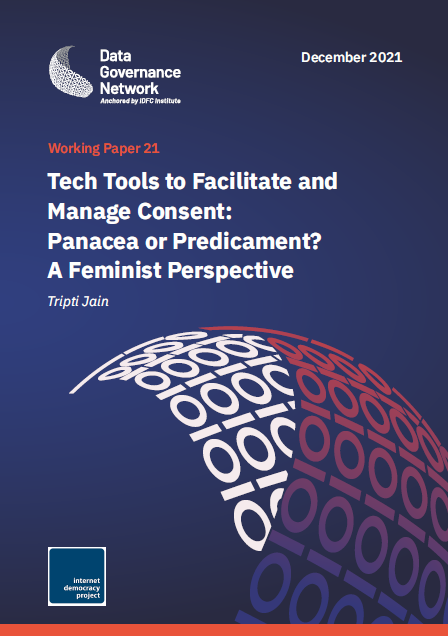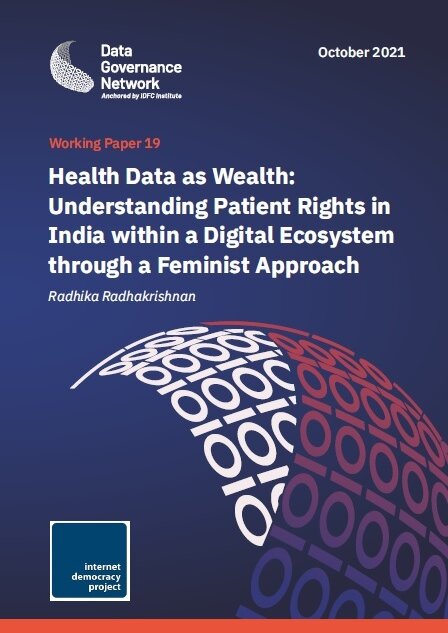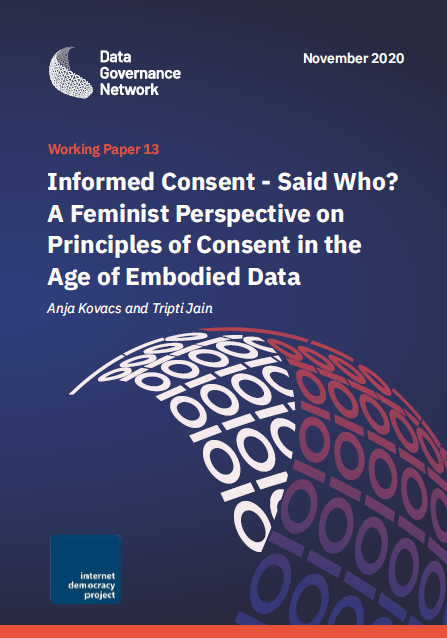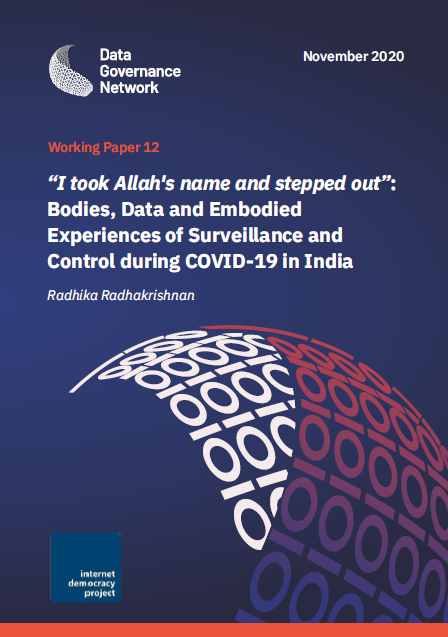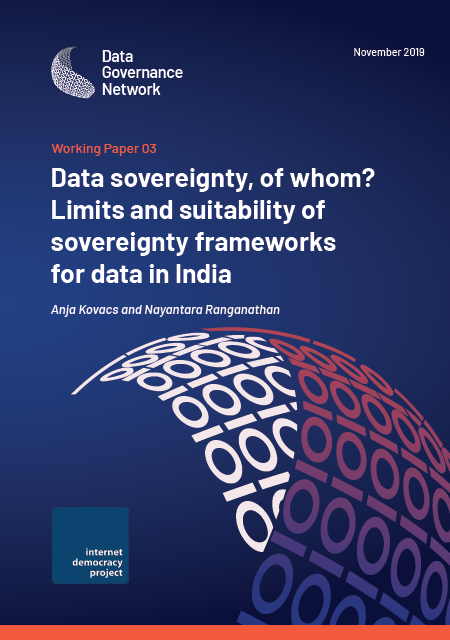Towards an embodied approach to data

Dominant discourses tend to construct data as a resource of some sort, as something that is simply out there and ready to be mined. However, our work at the Internet Democracy Project has highlighted that such descriptions of data often do not match people's experiences. To name but one example, victims of the non-consensual sharing of sexual images generally do not describe the harms they experience in terms of a data protection or even privacy violation. Rather, they describe the harms as similar to those arising from sexual assault: as a violation of bodily integrity.
Taking people’s experiences as the starting point, thus, makes evident that in practice, the line between our physical and virtual bodies is increasingly becoming irrelevant - so much so, in fact, that maintaining the distinction is becoming harmful. In the digital age, bodies and data are closely intertwined. The nature and impact of data and data practices is embodied.
Below you can find some of the Internet Democracy Project's key contributions highlighting why and how acknowledging and centring these entanglements in policy matters, even more so for people who are already marginalised in one or more respects, and what concretely needs to change in policy and practice if we are to continue to promote and protect our autonomy, equality, dignity and freedom in the digital age.
When our bodies become data, where does that leave us?
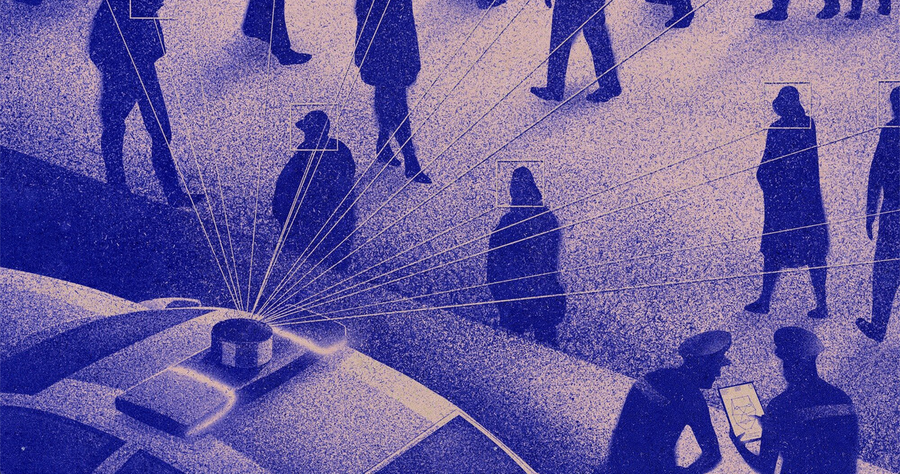
While dominant discourses treat data as a resource, in practice it is increasingly closely intertwined with our bodies. And not recognising this embodied nature of our data leaves already marginalised people in particular, this essay for Deep Dives argues, at tremendous risk.
Explore our other research on this issue
-
Tech Tools to Facilitate and Manage Consent: Panacea or Predicament? A Feminist Perspective

In this exploratory study, I assess account aggregators (AA) in India, and the emerging ecosystem in which they are embedded, against the feminist principles of consent in the age of embodied data. While consent continues to be a cornerstone of ensuring autonomy across data protection regimes, research has nevertheless been critical of it. In an earlier study, Anja Kovacs and I (Kovacs & Jain, 2020) identified the current perception of data, i.e. as a resource, as one of the crucial problems plaguing existing consent regimes; instead, we demonstrated, data is increasingly functioning as an extension of, or even integral to our bodies. We then built on this reconceptualisation to draw parallels between feminist learnings around sexual consent and data protection, to delineate six feminist principles that need to be observed in data protection regimes for consent to be meaningful there (Kovacs & Jain, 2020). Meanwhile, technology-enabled consent frameworks, such as the account aggregator framework conceptualised and launched in India, aim to similarly address key criticisms of consent regimes today, to thus strengthen user consent and the autonomy of individuals. I examine in this research study how well the developing AA ecosystem in India is delivering on these claims in practice. Assessing it against each of the feminist principles of consent, I ask to what extent AAs align with the feminist principles, whether AAs are effective, and what the way forward is. As we will see, while AAs do mark a notable improvement over existing consent regimes in a number of ways, many weaknesses remain. All too often, this is because AAs are positioned as a silver bullet: changes in the broader landscape in which they are embedded, while crucial to their mission, remain absent. As long as this does not change, it will not be possible for AAs to do all the work that is currently expected from them. More
-
Health Data as Wealth: Understanding Patient Rights in India within a Digital Ecosystem through a Feminist Approach

Over the past few years, there has been a drive towards the digitisation of healthcare in India. Policy frameworks in the country are incentivising further datafication by considering health data to be a commodity. In the context of big data, I argue that when health data is viewed as a disembodied resource, access to people’s health data becomes a form of power, giving those with such access the unparalleled and unprecedented power to influence the governance of people’s bodies and lives. Recognising the interconnections between our bodies and data from within an alternative feminist framework, this paper analyses the datafication of health in India through emerging developments proposed under the National Digital Health Mission (NDHM) ecosystem, and its implications for the bodies and rights of people. This work seeks to understand how datafication contributes to the disembodiment of health data in policy frameworks; the consequences of disembodiment for how people’s health data is understood to have value and who can benefit from that value, with a focus on health insurance companies; and how acknowledging the relationship between health data and bodies within policy frameworks can empower people to safeguard their right to equitable healthcare. More
-
Informed consent – Said who? A feminist perspective on principles of consent in the age of embodied data

While consent continues to be a crucial element of data protection regimes around the world, it has also been diagnosed with numerous weaknesses as a tool to promote and protect individuals’ autonomy. In this paper, we set out to learn from feminist theory around consent in general and feminist applied thinking around sexual consent in particular how consent regimes in data protection can be strengthened. We argue that such a journey will be promising because of the close entanglements between our bodies and our data. We particularly foreground feminist criticisms of the concept of “property in the person” to understand in more detail the profound harms that current data practices do to our personhood, as well as the ways in which consent is currently deployed to enable and even legitimise such practices, rather than challenge or reject them. Through close engagement with feminist thinking around consent, we then develop a list of feminist principles that will need to be followed if consent is to ever be meaningful in data governance. Finally, we outline three areas of change that the application of these principles immediately points to: changes related to the collection of data; changes related to the uses of data; and changes required to protect people who are especially vulnerable in particular. Making these shifts, we argue, is essential if we are to put into place a data infrastructure that is actually empowering for, rather than exploitative of people. This paper was first published by the Data Governance Network. More
-
“I took Allah’s name and stepped out”: Bodies, data and embodied experiences of surveillance and control during COVID-19 in India

This paper presents a study of COVID-19 in India to illustrate how surveillance is increasing control over bodies of individuals, and how the dominant framework of data as a resource is facilitating this control. Disembodied constructions of data erase connections between data and people’s bodies and make surveillance seem innocuous. As a departure from such a framework, this study adopts a feminist bodies-as-data approach to pinpoint the specific, embodied harms of surveillance. Starting from lived experiences of marginalised communities whose voices are often left out in debates on data protection, it shows that surveillance undermines not just data privacy, but more importantly, the bodily integrity, autonomy, and dignity of individuals. This paper was first published by the Data Governance Network. More
-
Data sovereignty, of whom? Limits and suitability of sovereignty frameworks for data in India

Sovereignty is seeing renewed relevance in the age of data in India as it has become the framework of choice in a number of data governance proposals by the Indian government. To understand the scope, import and consequences of these reassertions of sovereignty, however, it is important to unpack the nature of these claims as they have been put forward. In particular, to what extent does this type of sovereignty allow for the exercise of autonomy and choice of the Indian people? This paper will demonstrate that such assessments crucially depend on how we construct the nature of data. In most dominant discourses, data is described as a resource of some sort. However, in practice the line between our physical bodies and our virtual bodies is increasingly becoming irrelevant: data, then, emerges not so much as a resource that is simply out there, but as an extension of our bodies. In order to benefit the people of India, assertions of sovereignty in the face of data colonialism will need to take these shifting realities regarding the nature of data into account. Through an assessment of policy proposals relating to sovereignty in the realm of data and new technologies, we seek to examine to what extent policy in India does indeed recognise these new realities, and what the value of these new assertions of sovereignty for the people of India consequently is. More
In short
-
Your health data is others’ wealth
Access to people’s health data holds the power to influence the governance of their bodies and lives, explains Radhika Radhakrishan in this essay that was first published by the Heinrich Böll Stiftung in Delhi on 2 November 2021. Read it below, or on the HBS website if you’d like to see the accompanying images as well! More
-
How Covid-19 helped government control your data and you
Pandemic-era data-enabled surveillance — via digital tracking, disinformation, a variety of apps, phones and drones — undermines data privacy, autonomy and dignity of individuals and specifically disadvantages women, research shows.This piece was first published in Article 14. More
-
Embodied surveillance during COVID-19 in India: A feminist perspective
Guidelines on public mobility may be needed to control community transmission. However, when this is carried out in a manner that evokes fear without taking into account the socio-economic contexts and needs of people, then it is not the disease being controlled, but rather the bodies of people through threats of collecting their data. This article was originally published for Observer Research Foundation (ORF) CyFy Edit here. More
-
At stake is our bodily integrity
Governments around the world are increasingly turning to technology as a tool to combat the spread of the COVID-19 pandemic. In India, these tools have ranged from various contact tracing apps to using drones. Privacy concerns have been raised about the use of such intrusive digital technologies by activists, lawyers and concerned citizens. But while these are valid, a crucial element remains unrecognised: what is at stake is not merely our informational privacy, but our autonomy, dignity, bodily integrity, and equality. Note: A shorter version of this article was originally published in the Hindu. More
-
Here are the consequences of linking women’s medical records to their Aadhaar
Aadhaar has been pitted as the snake oil of choice for various problems in society, including that of gender biased sex selection. In two proposals, one by Maneka Gandhi and another by two doctors, the tracking of women’s pregnancies is advocated as the means to monitor and curb the practice of gender-biased sex selection. But both these proposals seek to normalise surveillance of the bodies, decisions and data of women and girls, under the garb of ensuring their welfare. Ramya Chandrasekhar traces the various harmful consequences of using surveillance as the instrument of choice to eliminate the practice of gender biased sex selection, in a piece first published in the Indian Express. More
-
Playing the Aadhaar card
Will the final Aadhaar hearings that started this week, on 17 Janiuary, bring some relief where the privacy concerns of India’s people are concerned? Will our future world be one in which citizens’ autonomy, decision-making capacity and bodily integrity are further fostered or will we be saddled with architectures and ecosystems that fundamentally and continuously undermine these? Taking gender and the body as starting point, Dr. Anja Kovacs explains what is at stake in the Supreme Court case on Aadhaar and why there is no reason to be too hopeful yet, in this article first published in India Today. More
